Global Forum on Technology, Sustainability and Humanity 2025:
27 & 28 October 2025 – Madrid, Spain

[9:15 am – 10:15 am]

Plenary Session 1
[10:15 am – 11:45 am]
Connectivity is key for bringing people together, identifying common interests and ways to overcome joint challenges, Connectivity and interactivity shape a global economy and hold the world together. Yet, power struggles and strategic competition coupled with starkly different points of view fuel tensions and threaten to throw the world apart. What are the paths forward that can enable bonding institutions and digital infrastructure in support of peace, security and resilience in the face of recurrent conflicts, cyberthreats, natural and climate disasters?
What global and regional collaboration mechanisms, what local fabric, and what policy regimes can help accelerate the benefits of the digital economy for everyone and address societal challenges?

Coffee Break
Plenary Session 2
[12:00 pm – 1:30 pm]
By 2050, an estimated 7 out of 10 people will likely live in urban areas. Urban development constantly evolves in response to societal, economic, and technological shifts. Sustainable urban intelligence and participatory governance are transformative forces reshaping the urban landscape to deal with the challenges cites are facing. Yet, fragmentation, polarisation and environmental disruptions subject cities to enormous challenges. What can we expect from new modes of participatory governance — alignment of interests to manage demanding trade-offs, or excuses to take the easy way out?
Segment 2.1:
Urban Transformation: Aligning Contradictory Demands – Dynamism, Resilience, and Sustainability

Segment 2.2:
Urban Transformation: Sport Organisation & Stadium of the Future

Lunch Break
Parallel Session 1A
[2:45 pm – 4:15 pm]
Blockchain has emerged as the foundational technology offering solutions to improve business value chains, enhance efficiencies, enable a traceable and transparent system of trust based on consensus, while unlocking economic activities without the need for trusted third-party intermediaries. Blockchain can and will support AI. AI has some great benefits but plenty of unpredictable to be looked in.
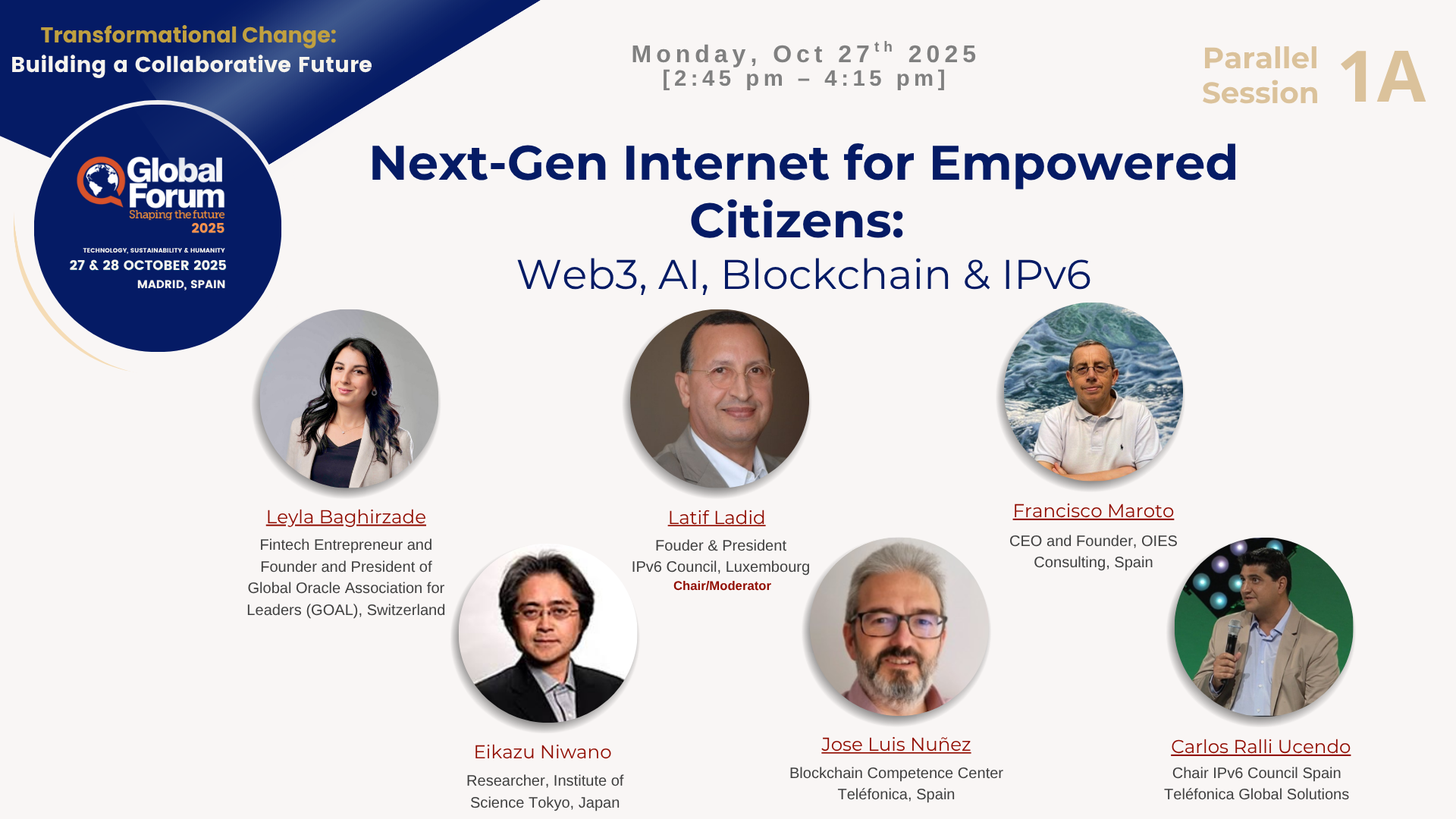
Parallel Session 1B
[2:45 pm – 4:15 pm]
The world has never had better tools, nor a greater need, for pursuing constructive, mutually beneficial collaborative agendas across science, health, education, water, energy, waste management, and beyond. How can technology be aligned with culture and societal values to unlock the full potential of cooperation, while countering the forces of conflict and polarisation?
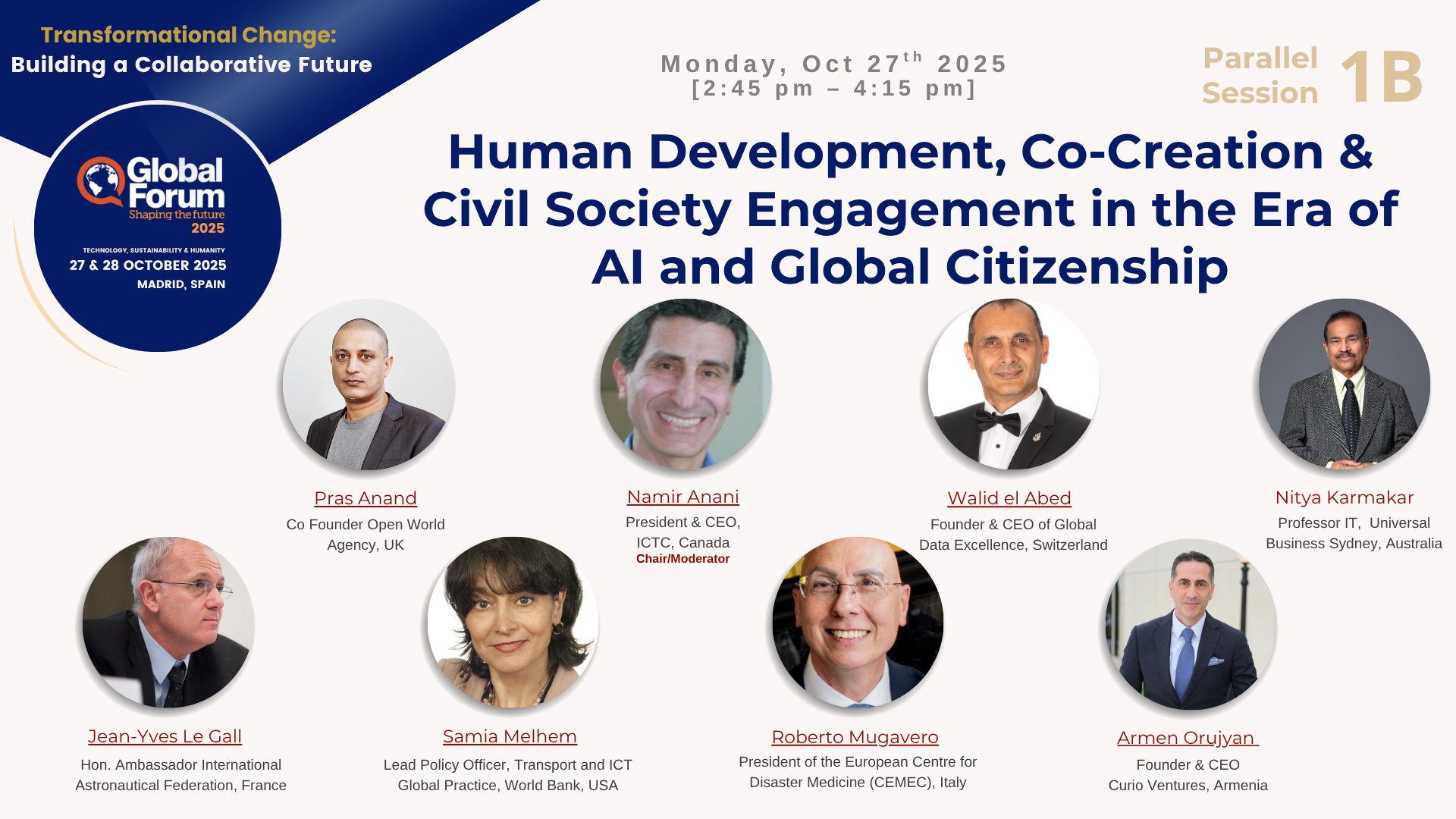
Coffee Break
Parallel Session 2A
[4:30 pm – 6:00 pm]
Agriculture and agrifood systems form the bedrock of all human societies but significantly contribute to carbon emissions and biodiversity loss. While entire populations face undernutrition, food is wasted across supply chains. The sector has to find a path to maintain high productivity, ensure better distribution, and health, while becoming radically more sustainable. Innovation might help streamline current practices or introduce new models like regenerative agriculture and platform markets. However, agriculture’s deep cultural roots and social dimensions present challenges for digital transformation, which must navigate tensions between production and sustainability, tradition and efficiency. Well-intentioned innovations can lead to unintended consequences, yet agriculture is in a key position to foster a more harmonious relationship between societies and their environment. Thus, innovation is a double-edged sword – capable of perpetuating inefficiencies or enabling transformative change.

Parallel Session 2B
[4:30 pm – 6:00 pm]
Humankind is facing fundamental challenges: climate change, technological revolutions, demographic transitions, geopolitical shifts. Progress and prosperity require engagement, creativity and pluralism. New approaches to managing shared challenges are needed along with long term visions, alignment of interests and global collaboration.
– Interactive Session –

♦♦♦
[9:30 am – 10:00 am]

Plenary Session 3
[10:00 am – 11:30 am]
Transformation of energy systems and handling increasingly destabilised water cycles are the top of the agenda for many societies around the world. But countries are in distinctly different positions, some overwhelmed by challenges, others benefitting. While multiple new solutions are at hand, some goals are conflicting, and competition is fierce. In many cases, the roll-out of new solutions is out of sync with infrastructure development. Climate and other sustainability policies appear at odds with industrial policies. At the same time, the interdependency of energy is set to intensify, with significant implications for both.

Coffee Break
Plenary Session 4
[12:00 pm – 1:30 pm]
Quantum technologies are no longer a distant promise – they are rapidly becoming a transformative force across industries and society. They can reduce AI data center energy use and accelerate materials and drug discovery. At the same time, they will revolutionise security by rendering current cryptographic systems vulnerable, while enabling truly secure quantum communications and advancing post-quantum cryptography.
Their disruptive economic and geopolitical potential is driving accelerated investment from both the private and public sectors worldwide. This session will bridge the gap between scientific progress and societal understanding, offering decision-makers and the public a clear view of where we stand today and how to prepare for a “Quantum-Ready” future.

All Quantum Session Presentations
Lunch Break
Parallel Session 3A
[2:45 pm – 4:15 pm]
Health is a global condition for the wellbeing of people. While disease management and the average life span have improved dramatically, new issues are evolving. Lifestyle unhealthy and chronic problems keep rising, as do mental disorders. With the natural world coming under pressure and uncontrolled advances in bioscience, the risk of pandemics spreading appears to be on the increase. Digital health, in its different forms, offers a range of new applications and means of improved health management and reaching out to cure many issues at much lower cost. It can help to reduce health disparities and significantly promote healthcare delivery by enhancing access and outreach.

Parallel Session 3B
[2:45 pm – 4:15 pm]
Culture shapes our values, defines our sense of identity, and supports social bonding. Cultures differ and they can clash, or they can evolve peacefully. The arrival of digitalisation had an enormous impact on how we engage with the world. Privacy, data protection, and security are deeply interconnected with rights, freedom, and responsibility. At the same time, a changing media landscape is becoming subject to disinformation, fragmentation, and the creation of ‘bubbles’, giving rise to populism and polarizing political discourse. We need to rethink our relationships with each other and our cultural heritage in ways that foster resilient, secure, and sustainable societies, aiming to heal rather than derail our digital society.
Nature-based Solutions have arisen as a tool for humans to reconnect with nature, to regenerate cities, and find new paths to channel nature’s diverse benefits to society more broadly. Yet, conservation of nature is under tremendous pressure. Are the two complementary and mutually reinforcing, or will one be at the expense of the other? Newly instituted carbon sinks are rewarded by carbon credits while the standing carbon sinks are not, and biodiversity credits are still in their cradle. Nature and culture linkages play out differently in different kinds of context. Geographies are changing — how can we ensure these changes are for the better? How are the outcomes decided?
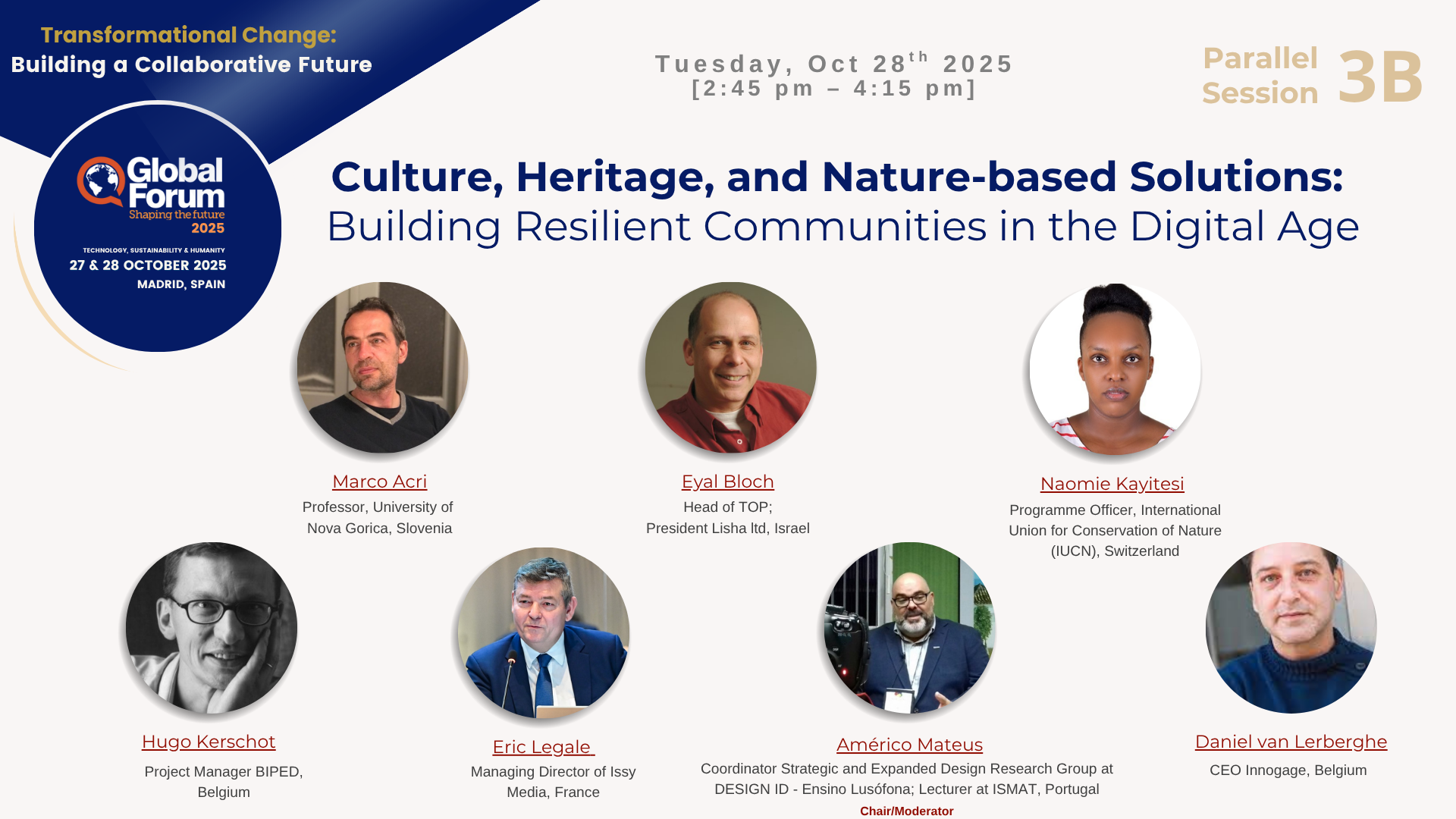
Coffee Break
Parallel Session 4A
[4:30 pm – 6:00 pm]
In today’s economy, the most valuable assets are often the ones we can’t touch: knowledge, creativity, data, and ideas. These intangible digital assets are what truly differentiate thriving organisations from those struggling to keep up. Four pillars stand out:
As we move further into a knowledge-based economy, managing and nurturing these intangible assets becomes not just a strategy but a necessity.
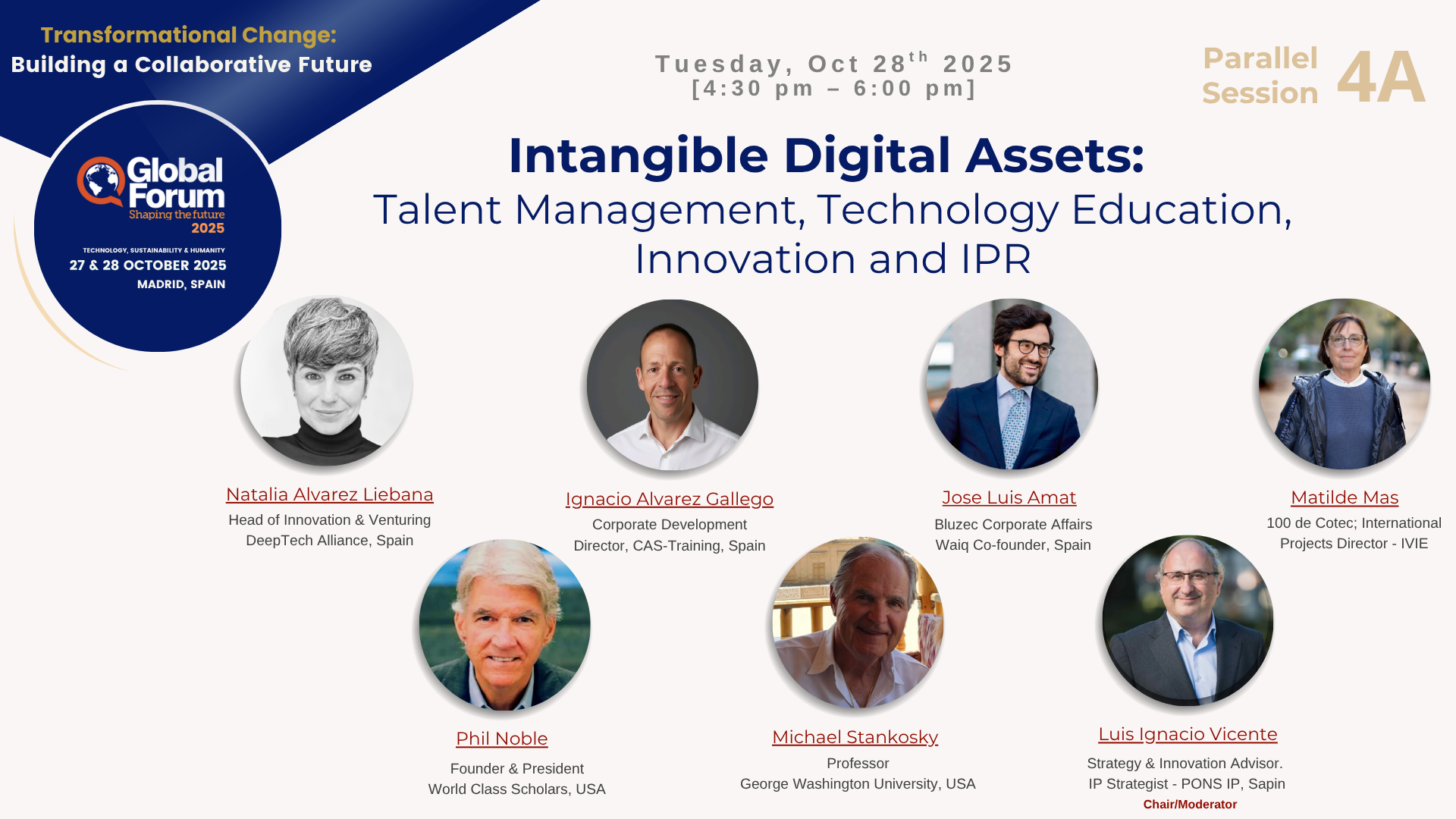
Parallel Session 4B
[4:30 pm – 6:00 pm]
Protecting data, digital assets, and digital infrastructure is a key priority for both national policies and private actors. Moreover, there is a significant shift towards advanced governance for responsible AI. New legislative, regulatory and other AI governance models are emerging at international, regional, national, and industry levels. This session aims to explore the interplay between cybersecurity and its ultimate goal: ensuring a fair and sustainable future for all. The technological dimension is only part of the overall picture, closely intertwined with the protection of fundamental rights in several complex ways: balancing the massive use of data (for AI development, among other applications) with personal data protection, ensuring the regulation-compliant and responsible use of AI in crime detection and prevention, safeguarding both the protection of marginalised groups and freedom of expression, and maintaining the continuity of essential services – such as water supply, power grids, and communication systems – in an increasingly conflictual world.
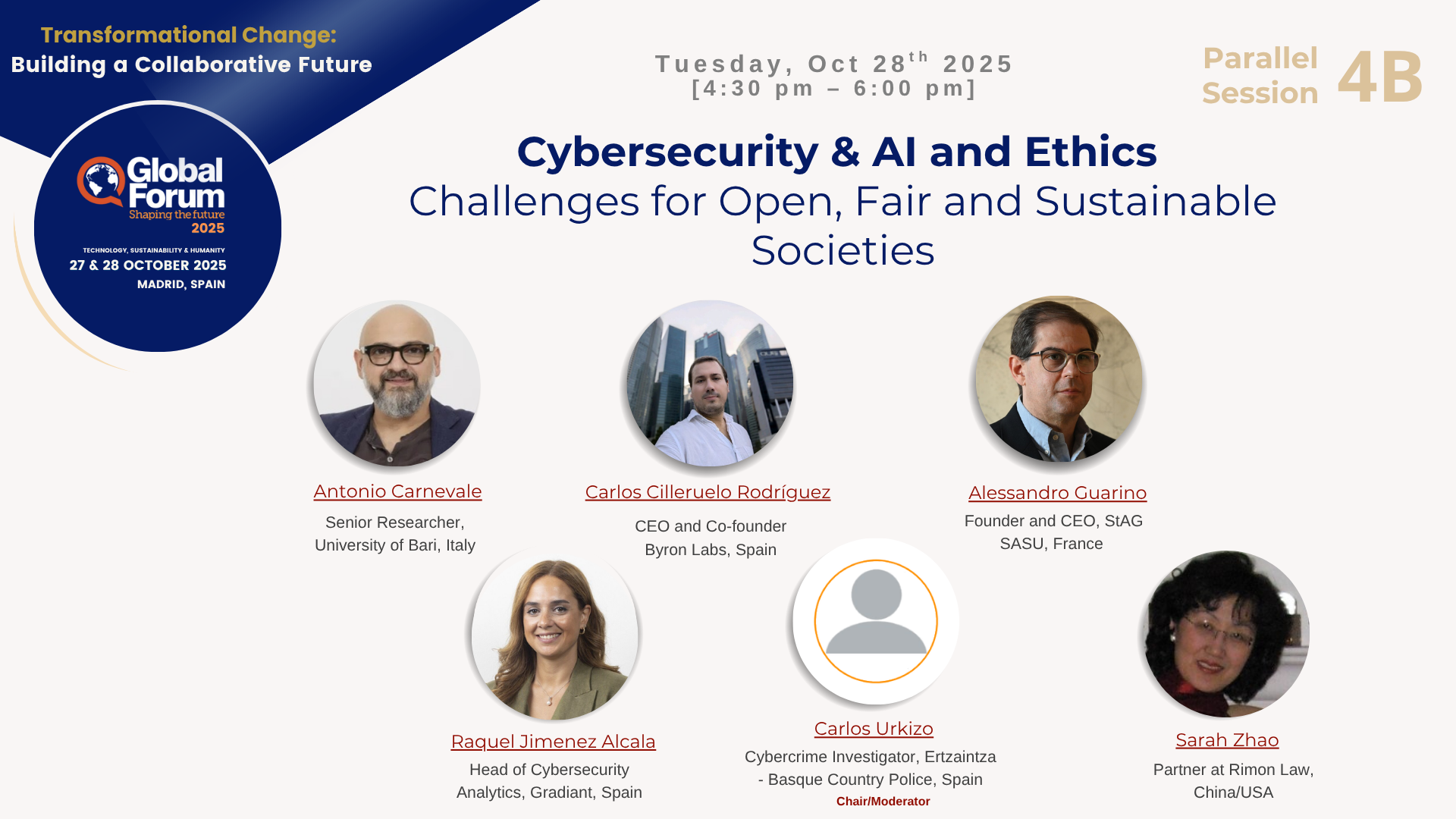
Plenary 5
[6:00 pm – 6:30 pm]
– Wrap Up Session –
The outcome of the Global Forum Shaping the Future will serve as the foundation for the Madrid Call to Action 2025, which will be published following the event.
♦♦♦
Marco Acri, Professor, University of Nova Gorica, Slovenia • Sylvie Albert, Professor and Former Dean, Faculty of Business and Economics, University of Winnipeg, Canada • Fernando Alvarez, Subdirector de Transformación Digital. D.G. Oficina Digital en Ayuntamiento de Madrid, Spain • Ignacio Alvarez Gallego, Corporate Development Director, CAS-Training, Spain • José Luis Amat, Bluzec Corporate Affairs; Waiq Co-founder, Quantum Investment Fund, Spain • Pras Anand, Co Founder Open World Agency, UK • Namir Anani, President & CEO at Information and Communications Technology Council – ICTC, Canada • Thomas Andersson, President IKED, Sweden; President Water & Humanity, Oman • Jean-Eric Aubert, President of Foundation 2100, France • Leyla Baghirzade, Fintech Entrepreneur; Board Member at Blockchain Azerbaijan, Switzerland • Franz Bergmeier, Development of green energy & hydrogen ecosystems, Germany • Alfonso Martos Berlanga, Ministry of Transport and Sustainable Mobility, Spain • Katherine D. Blizinsky, Neuroscientist & Science Policy Professional, USA • Eyal Bloch, Head of TOP and President of Lisha ltd • José María Bolufer, ESG Customer & Sustainable Innovation, Telefónica, Spain • Stuart N. Brotman, Professor School of Journalism & Media University of Tennessee, USA • Shaila Calvo Almeida, Head of eHealth & Biotech, Gradiant, Spain • Juan Cambeiro, 5G Customer Innovation, Telefónica, Spain • Mário Campolargo, Invited Professor at University of Aveiro; Former Secretary of State for Digitalisation and Administrative Modernisation of the Portuguese Government, Portugal • Victor Canivell, Co-founder & Chairman, Qilimanjaro Quantum Tech, Spain • Marcel Cardinali, Head of Sustainable Urbanism Research at TH OWL & Strategy Development at City of Detmold, Germany • Antonio Carnevale, Assistant Professor at the University of Bari, Italy • Carlos Cilleruelo Rodríguez, CEO and Co founder Byron Labs, Spain • Mariane Cimino, Co-Founder Cimbiose, France • Fernando de la Iglesia, Vice President Product, Quside, Spain • Astrid de Meijer, Co-founder of Beyond the Dots, The Netherlands • Oscar Diez, Deputy Head of Unit for Quantum Technologies, European Commission • Giuliano Di Vitantonio, CEO Teranode Group, Switzerland • Alain Ducass, Catalyst for Change & President of Al-Amiable and AEMA Mediation, France • Walid El Abed, Founder & CEO, Global Data Excellence, Switzerland • Ricardo Enríquez Miranda, Head of Quantum Advisory Team, Repsol, Spain • Guido Ferilli, Professor, IULM, Milan, Italy • Sébastien Grappe, PhD Student at ENS Lyon, INRIA, France • Stéphane Grumbach, Senior Scientist at INRIA, France • Alessandro Guarino, Founder of CEO StAG SASU, Cybersecurity and Data Protection Advisor, France • Juanjo Hierro, CTO FIWARE Foundation; Chairman FIWARE Technical Steering Committee, Spain • Antonio Jara, CSO / Executive Board Member Libelium, Spain • Raquel Jimenez Alcala, Head of Cybersecurity Analytics, Gradiant, Spain • Nitya Karmakar, Professor IT, Universal Business Sydney, Australia • Naomie Kayitesi, Programme Officer at IUCN’s Nature-based Solutions (NbS) Management Hub, Switzerland • Hugo Kerschot, Project Manager BIPED, Belgium • Latif Ladid, Founder & President, IPv6 Forum, Luxembourg • José Miguel Lameiras, Assistant Professor, BIOPOLIS/CIBIO, University of Portugal • Eric Legale, Managing Director of Issy Media, France • Jean-Yves Le Gall, Honorary Ambassador International Astronautical Federation, France • Diego R. Lopez, Senior Technology Expert, Telefónica, Spain • Miguel Lopez Valverde, Regional Minister for Digitalization of the Community of Madrid, Spain • Francisco Maroto, CEO and Founder OIES Consulting, Spain • Vicente Martin, Professor, Madrid Quantum Network – Universidad Politécnica de Madrid, Spain • Américo Mateus, Lecturer at ISMAT – Portimão, Portugal. Researcher at CIAUD – Pólo COFAC, Coordinator of the Strategic and Expanded Biodesign Research Group at DESIGN ID, Portugal • Samia M. Melhem, Lead Policy Specialist on Digital Development, The World Bank • Roberto Mugavero, President of the European Centre for Disaster Medicine (CEMEC), Italy • Michael P. Nash, Filmmaker, Founder of Beverly Hills Productions, USA • Eikazu Niwano, Researcher at the Institute of Science Tokyo, Japan • Phil Noble, Founder & President, World Class Scholars, USA • Jose Luis Nuñez, Blockchain Competence Center Telefónica, Spain • Dolores Ordoñez, General Director AnySolution, EU Agri Dataspaces, Spain • Armen Orujyan, Founder and CEO, Curio Ventures, USA • Griffin Peddicord, Strategic Adviser Xange.com, UK • Pascal Poitevin, Senior Consultant at ITG Groupe, France • Carlos Ralli-Ucendo, Head of IPv6 Council Spain • Ventura Sarasa, Quantum Scientist Associate – BBVA, Spain • Christian Schmitz, Founder PDIE – Purpose Driven Innovation, Japan • Jorge Serrano Leal, Technical Director CREA Madrid Nuevo Norte, Spain • Manuel Sierra Castañer, Director ETSIT UPM, Spain • Michael Stankosky, Professor, Author, Scholar, Lecturer, and Editor-Emeritus, George Washington University, USA • José Luis Tallon, Global Forum 2025 Local Host, CEO & Co-funder We Are Technology – WAT, Spain • Rocío Torres, Head of Sustainability & Responsible Business, Atletico de Madrid, Spain • Daniel van Lerberghe, CEO at Innogage, Belgium • Alejandro Ugarrio Andrés, Director of Atleti Lab – Atletico de Madrid, Spain • Luis Ignacio Vicente, Strategy Advisor, PONS IP, Spain • Victor Villagrá, Subdirector ETSIT UPM, Spain • Sarah Zhao, Partner at Rimon Law, USA/ China
and many more!
Registration for the Global Forum 2025 is subject to approval. The review process may take a few days. Once your registration request is approved, you will receive a link to proceed with full registration and payment (if applicable).
Don’t miss the chance to be part of another exciting Global Forum. Register soon and join us for an unforgettable event! We look forward to welcome you at the Global Forum 2025 in Madrid!
| Category | Early Bird (closed) | Standard |
| Companies | 900 € | 1 400 € |
| Start-ups | 350 € | 500 € |
| Public Services | 350 € | 500 € |
| NGOs & Academia | 350 € | 500 € |
| Local Participants* | 390 € | |
| Media / Press** | free | free |
*Participants from Madrid and the surrounding area
**upon presentation of a valid press card
Participation fees cover admission to all meetings and events
Rooms at the Eurostars Madrid Tower Hotel are available to event attendees at exclusive, highly preferential rates – designed to encourage networking throughout the event. Extended stays are also available.
Further details will be provided with your final registration.
